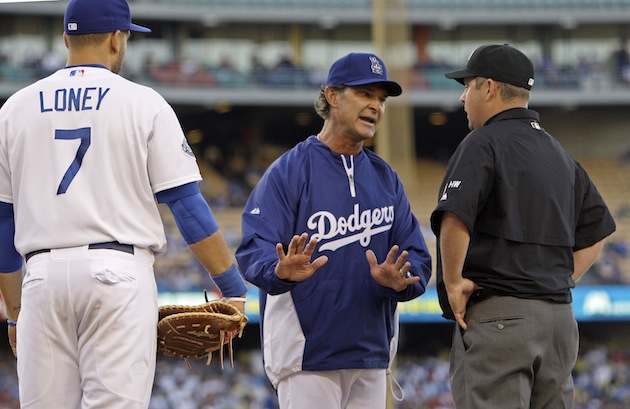
Jim Leyland wasn't the only one upset with umpires on Monday, Dodgers first baseman James Loney took it a step further.
After a call went against Loney, he went beyond just the sixth-inning call on Norichika Aoki's comebacker to the mound, to balls and strikes.
"Whatever it takes, just get it right," Loney said (via ESPNLosAngeles.com.) "Even the guy behind the plate. A guy leaning behind the catcher doesn't have the best view of all the balls and strikes. Watch the center field camera, that is the best way to call balls and strikes. It's going to take more and more bad calls for all of that to happen."
Loney went on to predict that "within 50 years," baseball would have electric umpires.
That seems to be a little much -- remember we're talking about baseball, which accepts innovation on the field at a glacial pace, which for many is part of its charms. It should also be noted that not all centerfield cameras are the same -- or provide the best view of balls and strikes.
That said, Loney's right about one thing -- because we have the technology for replay, it should be used to, as he said, "just get it right."
The outcome of Monday night's Dodgers-Brewers game could have been different if there were some way to review close calls.
Here's the scene -- in the sixth inning of Monday's 3-2 Brewers win at Dodger Stadium, first base umpire Todd Tichenor ruled Loney pulled his foot off the bag to get Aaron Harang's throw at first. Replays showed Loney kept his foot on the bag -- and even though both Loney and manager Don Mattingly asked Tichenor to ask for help, he did not.
"We knew he missed the call right away," Loney said (via the Los Angeles Times). "I didn't have to go see the replay. The confusing part, I think, to a lot of people would be, why wouldn't you ask for help? You're saying that's your call, but nobody's perfect."
Home plate umpire Brian Gorman told Tony Jackson of ESPNLosAngeles.com that any member of the umpiring crew could have approached Tichenor and told him they had the definitive view, it's not up to Tichenor to ask for help. And, as demonstrated by the situation in Detroit, even when an umpire asks for help, that's no guarantee the call will be made correctly.
Even with four umpires on the field, it's difficult to make every call right. But there is someone who always sees the play and sees it correctly -- the video. There have always been bad calls in baseball games, even before Don Denkinger. It's part of the game, but it doesn't need to be. We see more mistakes now because technology allows us to do so, we should use that same technology to make the calls right. As umpire Tim Welke told CBSSports.com Insider Danny Knobler, "What looked crystal clear [on video] didn't look crystal clear from the first-base line." That's because there's enough technology available to improve the game on the field as much as it's improved watching it at home. Every game is televised, every game has HD cameras, every call could be scrutinized better, and as Loney said, "Get it right, whatever it takes."
Baseball moves quickly and there are "bang-bang" plays that are too fast for the naked eye. Unlike most, I watch games and I'm amazed at how many plays the umpires get right, more than I'm surprised at how many they get wrong. The MLB should -- and this may be the first time this has ever been written -- look to what Gary Bettman and the NHL has done. In the NHL, all goals are reviewed at the central office in Toronto, the so-called War Room.
Baseball should do the same thing, establishing a base in New York -- or wherever -- that has all games being watched by a trained umpire watching. The Big Brother umpire will be on the call, just as soon as it happens. That official will have the technology to watch it and review it. If an umpire wants to get another look, he can get in touch with the home office, or the home office can get in touch with him. And for those wondering about how much time this will take, with the technology we have now, it could take less time than it'd take for the average manager to run out to the field to yell at the umpire, and certainly less time than the quorum of umpires on the field.
In the end, the right calls can put the focus back on the game and away from the umpires.





















